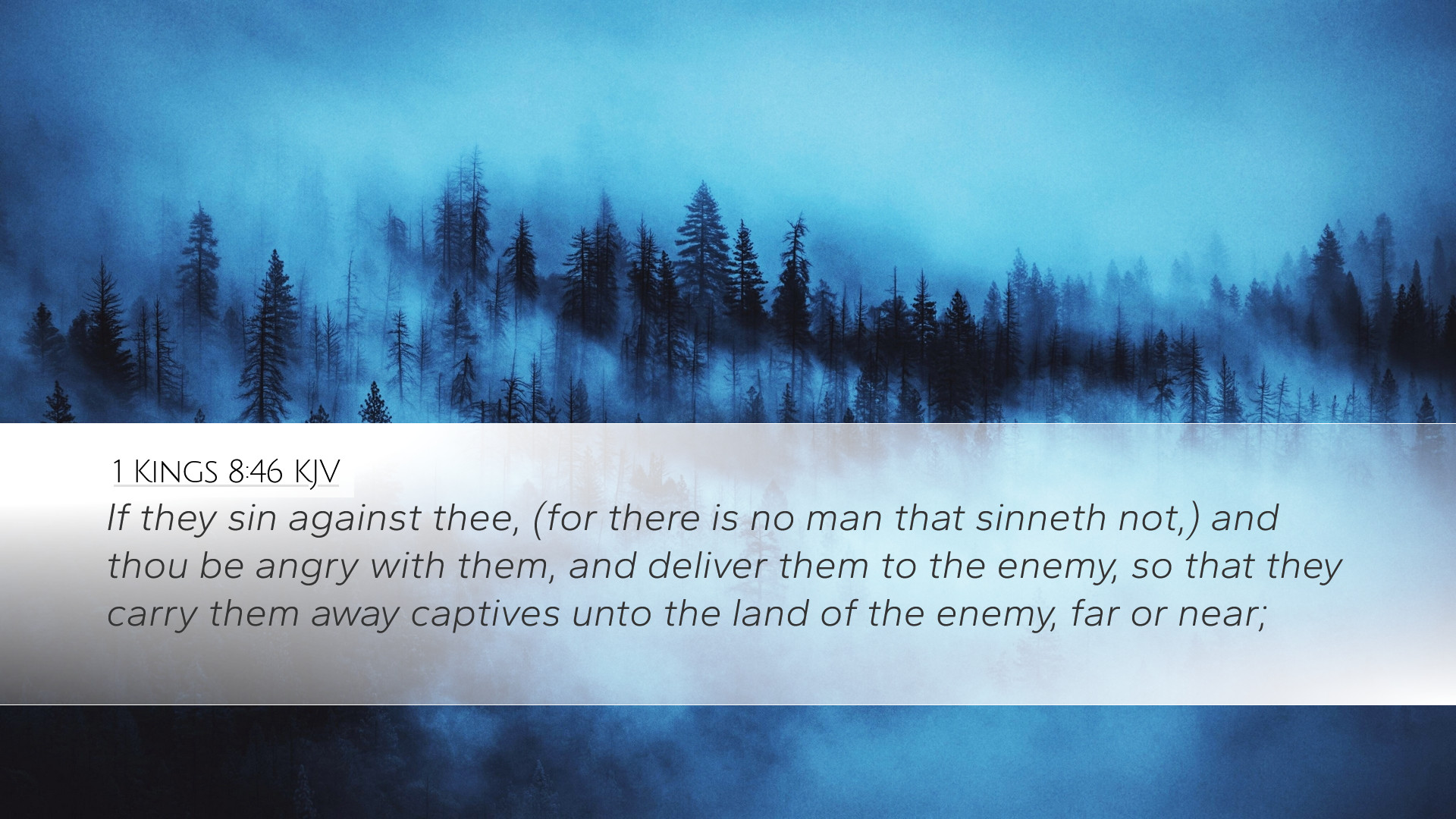Commentary on 1 Kings 8:46
Verse: "If they sin against You, for there is no one who does not sin, and You become angry with them and deliver them to the enemy, and they take them captive to the land of the enemy, far or near."
Introduction
This verse comes from Solomon’s dedicatory prayer during the inauguration of the Temple, marking a significant moment in Israel's history. Here, Solomon acknowledges the reality of human sinfulness and God's responses to it. This commentary synthesizes insights from recognized public domain sources: Matthew Henry, Albert Barnes, and Adam Clarke.
The Nature of Sin
Matthew Henry highlights the universality of sin, noting, "there is no one who does not sin." This affirmation points to the fallen nature of humanity as outlined in the Scriptures (Romans 3:23). Sin is portrayed not just as an action but as a condition inherent in mankind that separates them from a holy God.
Albert Barnes comments on the inevitability of sin in the lives of even the most righteous individuals, suggesting that recognition of this truth is essential for genuine repentance. He elaborates on the significance of this acknowledgment: it leads to an understanding of human dependence on divine grace.
God’s Anger and Discipline
God's anger. Adam Clarke elaborates on this divine response, asserting that God's anger should not be regarded as pure wrath but as just retribution calling His people to repentance. They teach that God's discipline is rooted in His love, intended to correct and restore rather than to destroy.
Matthew Henry further emphasizes this theme by stating that God’s anger is proportionate to the severity of sin and is often a precursor to His discipline. He connects the notion of discipline with the idea of covenantal faithfulness, highlighting how Israel is chosen yet prone to sin.
The Consequences of Sin
The verse outlines serious consequences: "and deliver them to the enemy." Albert Barnes interprets this as a warning about the societal and spiritual repercussions of disobedience. The text reflects the historical reality of Israel being taken captive and their consequent suffering.
Matthew Henry notes, "far or near" emphasizes the comprehensive nature of God's judgment. Whether the enemies are geographic foes or internal apostasy, the repercussions can be felt in every aspect of life. Henry invites readers to consider how spiritual neglect often leads to tangible consequences.
Assurance of Restoration
Despite the grim situation portrayed, Solomon’s prayer encompasses the broader narrative of hope. Adam Clarke points out the implicit promise that even in captivity, there is a path to restoration. The reality of God’s discipline is layered with a call towards repentance and renewal, fostering a deeper relationship with God.
Matthew Henry concludes that through Solomon's prayer, there is a profound expectation of mercy accompanying justice. This pivotal verse serves as a reminder that while God may allow His people to face the consequences of sin, His ultimate goal is their restoration and return.
Practical Applications for the Faithful
- Understanding Human Flaws: Believers should acknowledge their own propensity to sin, fostering humility before God.
- Responding to God’s Discipline: When faced with difficulties, consider the possibility of divine discipline rather than mere misfortune.
- Seeking Restoration: Engage in genuine repentance, recognizing the relationship between sin, discipline, and God's restorative grace.
- Encouragement in Revival: As Solomon prays, it is paramount to seek collective restoration and unity in prayer, encouraging congregations to remain faithful.
Conclusion
The verse from 1 Kings 8:46 serves both as a sober reminder of human sinfulness and the nature of God's justice. Drawing from Matthew Henry, Albert Barnes, and Adam Clarke, it becomes evident that while sin has serious implications, it is met with God’s unwavering love and a desire for restoration. As pastors, students, theologians, and scholars reflect on this scripture, let them uncover deeper truths that inform their faith and inspire their communities towards holiness.


